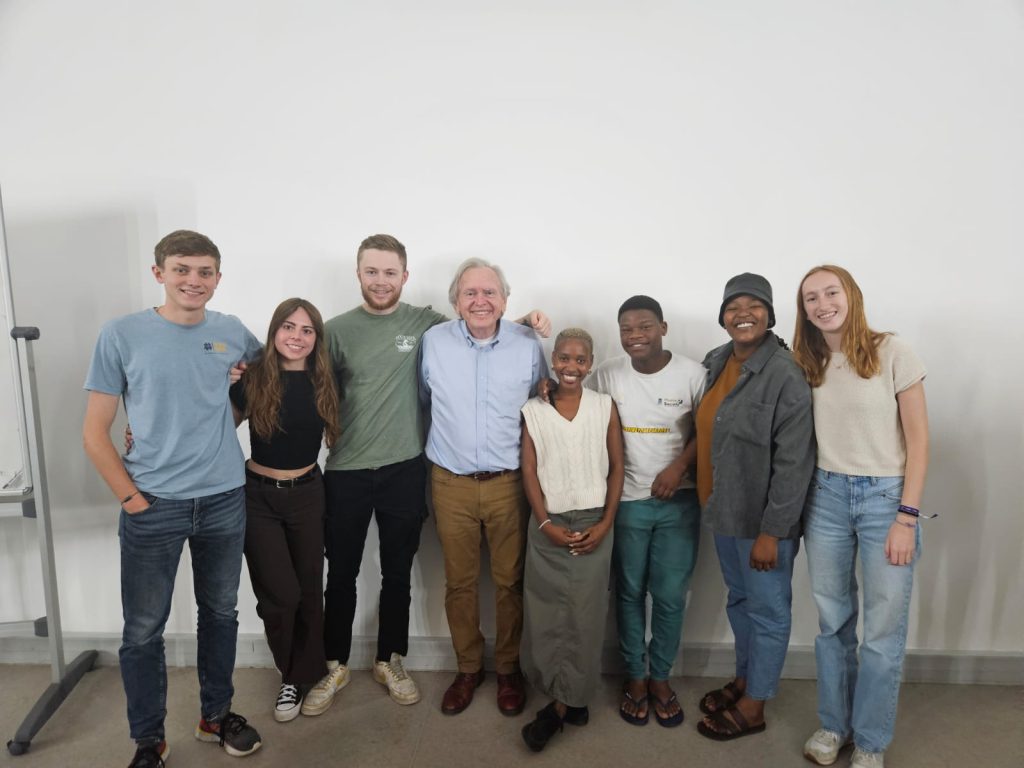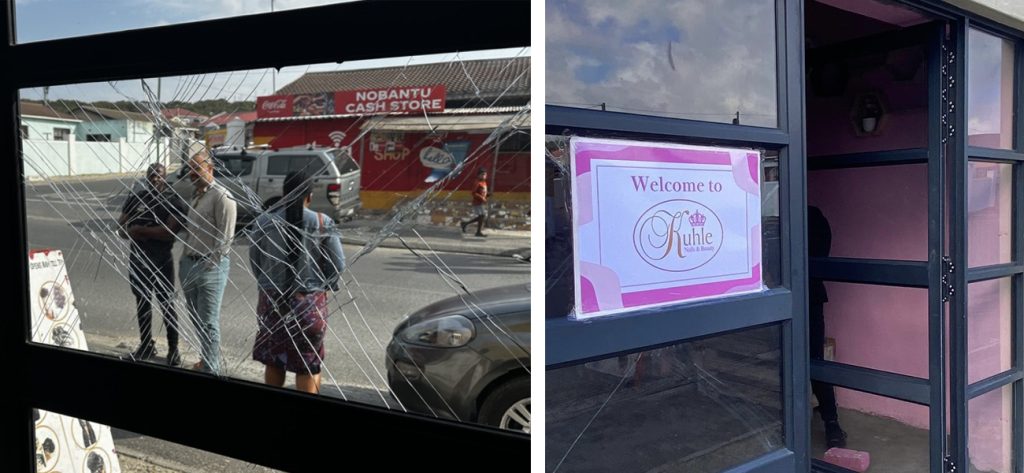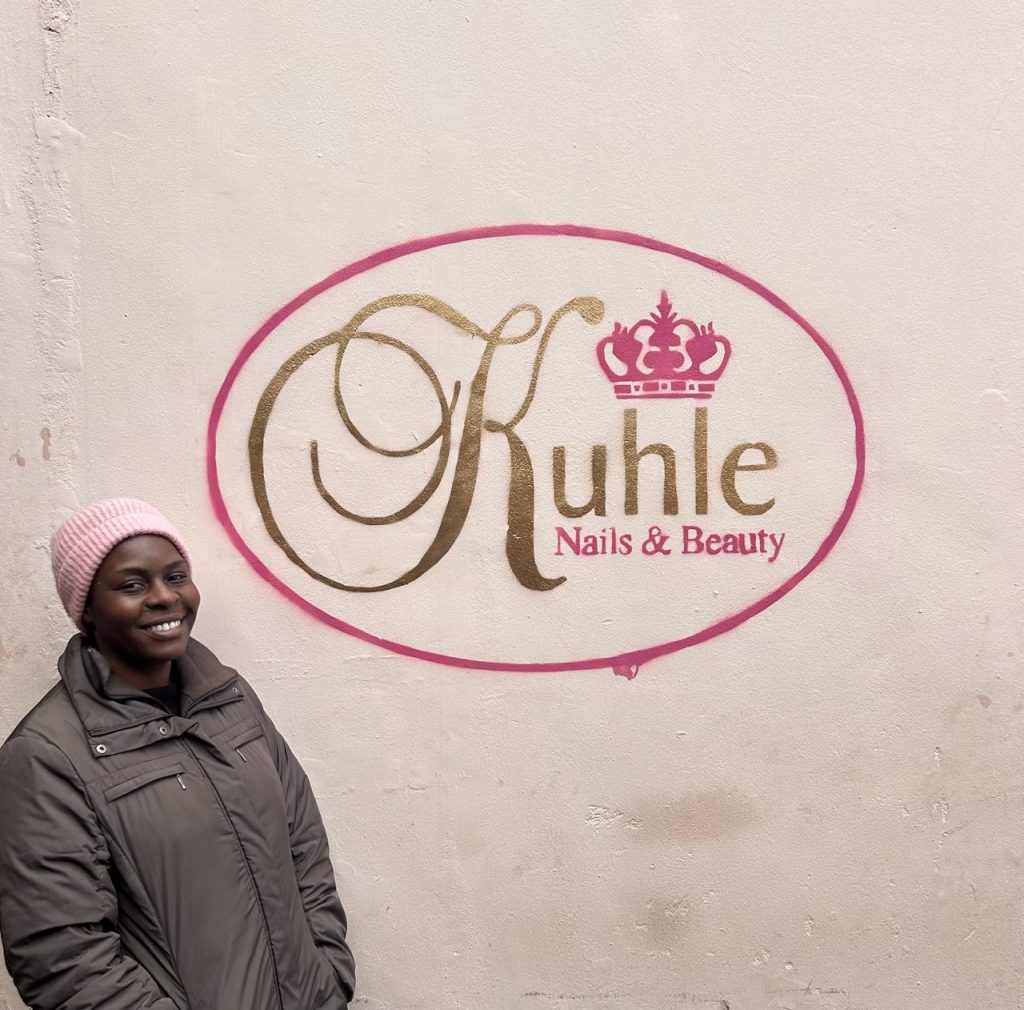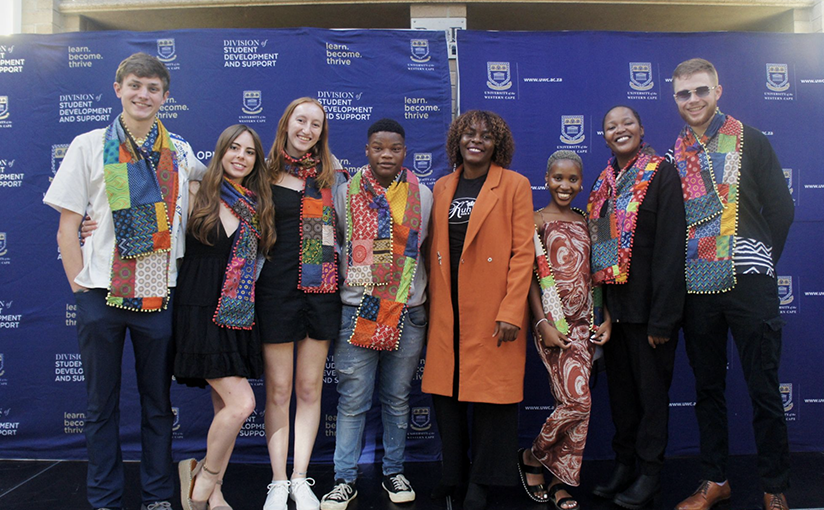Before my experience with the Entrepreneurship and Empowerment in South Africa (EESA) program began, I did everything I could to prepare. I read every article I could find and watched a video of a student from last year’s cohort at least a hundred times. In hindsight, I realized that there was nothing I could have done to prepare for what was ahead of me.
My seven-person team, BuMandla Consultancy, included students from the University of Notre Dame, the University of Colorado Boulder, and the University of the Western Cape. We spent six weeks serving as consultants for our two clients, Kudzai from Kuhle Nails and Beauty and Nomgcobo from Gcogco Clothing Studio.
We began by learning everything about their businesses: marketing, human resources, inventory management, customer experience, bookkeeping, and more. We then identified the most important issues for the businesses and worked to develop and implement solutions to these problems.

Michael Morris (fourth from left), professor of the practice in the Keough School of Global Affairs.
Each day presented new challenges that often seemed impossible: How do we set prices that generate enough profit to sustain the business while remaining affordable for the township community? How do we convince employees to stay when competitors offer higher salaries? How do we ensure our clients understand how to use the bookkeeping spreadsheets we create for them?
The questions never ended, and as these problems arose, I quickly realized that I didn’t have a clue what I was doing. But that was the beauty of it all. The unfamiliar terrain forced us to brainstorm, try, fail, and try again. My team and I tackled these problems, with some of our deliverables being a human resources development workshop, a costing calculator, a plan for downsizing services, employee accountability systems, and marketing campaigns. I was challenged more than I thought possible in those six weeks, but I also experienced more passion, hope, and personal growth than I ever had before. Waking up with purpose each day, working with passionate people, and having an impact on entrepreneurial businesses was so special.
I arrived in Africa with the intention to serve clients, but in reality, they served me, teaching me more than I could have ever learned in a classroom. Kudzai and Nomgcobo showed me what genuine commitment looks like and how passion and a drive to learn are the keys to progress. Before EESA, I viewed entrepreneurship as creating a new, never-seen-before idea, something you might see on Shark Tank. But throughout my time in South Africa, I learned it is much more than that. I now understand that entrepreneurs are people with dreams who pour their whole selves into their businesses. They creatively solve problems and continue onward, maintaining hope regardless of their circumstances and challenges. They question what is around them and choose to push beyond mediocrity. Entrepreneurs chase excellence. Watching Kudzai and Nomgcobo live this out daily taught me how to do the same. I learned to follow their lead, chasing excellence by embracing uncertainty through two key principles: adaptation and vulnerability.
Adaptation is critical
Working with limited resources and funds, we encountered many challenges in executing our goals; we had to adapt. At Kuhle Nails and Beauty, a shattered window and an absence of exterior branding created an unprofessional first impression. Rather than getting the window repaired, we saved money by covering the broken glass with a large Kuhle logo, which improved the business’s appearance and made branding more visible.

We also wanted to paint the logo on the wall, a project that required significant adaptation. We hoped to purchase a stencil, but due to high prices and limited time, we had to create one ourselves. We printed the logo on a large paper and then used what was available—a kitchen knife—to cut it out. The painting process proved to be even more difficult. The windy weather broke the thin paper stencil, and we used tape to reassemble it before painting. This branding project exemplifies how EESA helped me develop a “we will figure it out” mindset. Rather than becoming overwhelmed by problems that seem impossible, I know I will figure out a way by thinking creatively, using available resources, and not giving up.

The key to growth
During my interview for EESA, Professor Michael Morris described how the greatest sign of an educated person is someone who recognizes what they don’t know. EESA showed me this firsthand and taught me the value of vulnerability through my clients and myself. Nomgcobo was especially hesitant to admit she didn’t understand the intricacies of her business, and her financial systems were practically nonexistent. Once we built our relationship further and she became comfortable opening up, growth was noticeable.
We had discussions and developed systems to help her gain control of her business. I experienced this same growth within myself throughout my work on my team. I leveraged the strengths of my group members to build upon my weaknesses. Admitting what I wasn’t confident with and then diving head-first into it was critical; that is how I learned and grew. Kudzai said it best herself. She gave a speech to her 60 employees during our human resources development workshop and said, “Each one of you is special in their own way. Let’s embrace each other’s strengths and weaknesses and master the art of bringing out the best in each other.”
At the end of EESA, I walked off the plane feeling ready to embrace life’s unpredictable challenges and take on the world. I attribute the transformational growth I experienced to the unfamiliar terrain I charted and eventually became more comfortable in. Stepping outside my comfort zone was the best thing I could have done. I may not have ended poverty or increased my clients’ income by a million dollars, but I empowered Kudzai and Nomgcobo and they empowered me. It was an honor to work with such passionate people who are paving a pathway out of poverty through the power of entrepreneurship.
I am forever grateful for the friendships, knowledge, discomfort, challenges, and victories that EESA provided me. Thank you, Kudzai, Nomgcobo, BuMandla Consultancy, Dr. Morris, Professor Erick Mueller, and Professor Jamie Kraft. Thank you, EESA. And thank you, South Africa. I am so lucky to have met people who made saying goodbye so hard.
Notre Dame sophomore Julia Flood is an economics major who is earning a minor in social entrepreneurship & innovation through the Keough School’s McKenna Center for Human Development and Global Business.
Top photo: The author’s student team, BuMandla Consultancy, at the closing ceremony for the Entrepreneurship and Empowerment in South Africa program, wearing scarves made by their client, Gcogco Clothing Studio.

